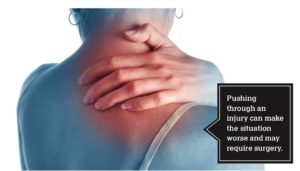For those who are dedicated to the gym, waking up sore after an intense workout can evoke a sense of pride and accomplishment. If there’s no pain there’s no gain, right? But, do you know if that pain is muscle soreness or muscle injury
Matt Walser, a physician’s assistant at the University of Florida and former associate head football athletic trainer for the Gator’s football team, said that this common locker room motto isn’t one to live by.
What the expert says:
“If you have an injury and you push through the pain, most of the time it gets worse and sometimes it gets significantly worse, where you require surgery,” Walser said.
Feeling sore seems to go hand-in-hand with working out. That means it can be tricky to distinguish between regular muscle soreness or muscle injury. It’s important to listen to your body. If you exercise regularly and experience extended muscle pain out of the norm, there’s a chance it could be something more. “Usually with a muscle injury, there’s an event, there’s a thing that occurred, such as a pop or a snap that you may have experienced,” Walser said.
If you suspect you have a muscle injury, there’s usually a cause and effect. Walser describes a muscle injury as “sharp, knife-like, fire-poker pain,” which is usually directed in one area and may contain swelling.
Muscle soreness is usually something that is a slow onset. It’s normal for your muscles to feel achier on the second day after a workout or even 48 hours afterwards, which is called delayed onset muscle soreness. While the tight sensation of sore muscles can be annoying, it does eventually go away.
“If you had a hard workout, the soreness is usually at its worst around day two or three and then it gets better after that,” said Walser. “But if you had continued muscle soreness, that’s a little bit of an issue. Muscle soreness that doesn’t go away is concerning.”
What should you do?
If you do have a muscle injury, the recovery time depends on the individual and the injury they experienced. According to Walser, a muscle strain might take a week or two. A more serious injury where you’ve pulled the muscle off the bone could require surgery and take months to heal. While you may be injured, there’s no reason to stop working out. There are other ways to break a sweat without hurting yourself more.
“If you hurt an arm, you can use your other arm to lift weights. You can squat, do stuff with your legs or go on an exercise bicycle,” Walser said. “In all my years in sports medicine, I’ve never told people to stop working out because I think it’s important to continue to be active.”
In order to help prevent muscle soreness or a muscle injury, it’s important to be realistic about your exercise regimen. Be in sync with our body’s needs, stretch, drink lots of fluids and eat well-rounded, healthy meals.
* Always see your doctor with any questions.
by Taylor McLamb


